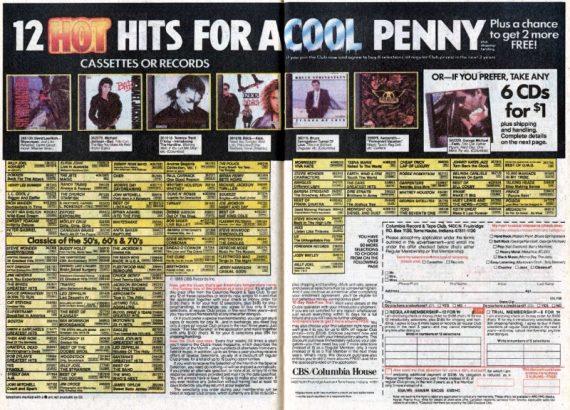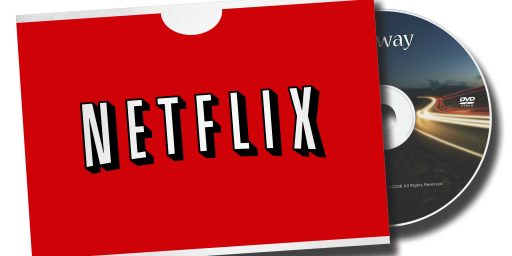Columbia House Files Bankruptcy, Many Surprised To Learn It Still Existed
A company you probably thought had died off years ago filed for bankruptcy protection yesterday.
A relic of the 70s and 80s that somehow managed survive until 2015 is no more:
The owner of onetime mail-order music giant Columbia House filed for chapter 11 bankruptcy protection Monday, seeking to sell what remains of its business after almost two decades of declining revenue.
Filmed Entertainment Inc. filed for chapter 11 at the U.S. Bankruptcy Court in Manhattan, citing the advent of digital music and dramatic changes in technology that are threatening to render CDs and DVDs obsolete.
Since peaking in 1996 at about $1.4 billion, revenue has declined almost every year since, according to FEI director Glenn Langberg. Last year, net revenue was just $17 million.
“This decline is directly attributable to a confluence of market factors that substantially altered the manner in which consumers purchase and listen to music, as well as the way consumers purchase and watch movies and television series at home,” Mr. Langberg said in court papers.
Columbia House was founded in 1955 as a division of CBS Inc. Historically, it was most active in the music industry, offering stacks of CDs or cassettes for as little as a penny. But Columbia House ended that business in 2010, leaving DVDs as its only remaining product line. Today, the DVD club has 110,000 members, according to court papers. Columbia House has licensing agreements with major film studios as well as smaller independent studios, court papers show. Those licenses, however, included only physical DVDs and not digital formats.
Now in bankruptcy, Columbia House’s parent has asked for bankruptcy judge’s permission to maintain its operations, supporting itself with existing cash. Currently, the company’s remaining DVD business has no employees and relies on third parties to carry out its operations.
(…)
Columbia House has been something of a hot potato in the digital age, changing hands rapidly. Bertelsmann AG bought it in 2005, but sold it in 2008, along with Book-of-the-Month Club and other U.S. direct-marketing businesses, to Najafi Cos., a Phoenix-based investment company, for an undisclosed sum. FEI’s current owner, Pride Tree Holdings Inc., bought the business in 2012. Pride Tree, a New York-based media and consumer technology investor, didn’t seek bankruptcy protection Monday.
Columbia House joins other CD retailers that have closed down or sought bankruptcy protection over the past decade, including Tower Records, Sam Goody and Musicland in 2006, Circuit City in 2008 and Virgin Megastore US in 2009.
“The thing I remember most is their unwillingness to change with the times,” said Mark Rubenstein, a former art director at Columbia House. “The writing was on the wall,” he said. “They either didn’t see the writing or didn’t want to read it.”
In all honesty, the most surprising part of this news is the fact that Columbia House still exists. Like many people I think, I had assumed that it just faded away years ago as the music industry made its change from physical media to digital downloads. In retrospect, of course, moving the business into the DVD area was a smart move since that was still an area where physical media dominated even up until less than ten years ago, but even there the writing was on the wall. At this point, I would imagine, more people think of Netflix as a streaming video service than the DVD rental business that it started out as so many years ago. Unlike Netflix, though, it doesn’t seems as though Columbia House even attempted to find a way to adapt its business model to a rapidly changing industry. In the end, I’m not sure that there was anything they could have done to adapt unless they ended up trying to out Netflix Netflix, which probably would not have gone too well. The fact that they still had 100,000 subscribers at this point is a good measure of how far things had fallen, especially since its unlikely that all of those subscribers were big revenue generators.
I’m sure I’m not alone in being one of the many people who was part of the Columbia House world when I was younger. In my case, it was probably early in my teen years and, like many others, I got sucked in by the whole “10 records or tapes for one penny” deal. On balance, it allowed me to get access to a lot of music easily but it also got my in trouble a few times when I was too lazy or forgetful to return the card you had fill out if you didn’t want their selection of the month. Not surprisingly, parents are none too pleased to pay for something when that happens. I didn’t say part of the “club” for very long, though. Certainly, I wasn’t getting stuff from them by the time I graduated high school and certainly wasn’t buying anything from the by the time Compact Discs were the big thing. In any case, it was apparently during that era that Columbia House actually saw its greatest sales, with the mid-1990s being among its best years in terms of revenue. They mastered the change of format back then, of course, but the switch to digital made this kind of business untenable.






Coincidentally, I just got rid of my 400 plus CD collection. Wasn’t playing them but rather streaming on Pandora and Spotify. I, too, was a big spender at Columbia House. Times change.
No mention of piracy…..
Progress has finally been made on this subject.
I still find this bizarre, since Netflix has at least ten times as many movies and TV shows on offer in DVD format than it does via streaming.
I bought my dad a CD player for Christmas last year. It was shockingly difficult to find one for sale at his desired quality point (not junk, but also not hand-plated by Swiss gnomes in a clean room at the full moon). That’s what really brought it home to me.
I joined Columbia House probably twenty times—sometimes having three or four memberships going at a time—starting in 1982. I bought a ton of cassettes and later CDs from them. But, yeah, it’s been a long time since I was a regular buyer of physical media.
Maybe it’s my age, but I still buy physical media – I’ve been burned by DRM so many times that I just buy the CD, rip it to a digital format, and throw it in the cabinet with the others.
Perhaps one day I’ll trust that another 20 years from now the digital music I “purchase” on iTunes or elsewhere will be honored by its owner, but I’m once-bitten, twice shy at this point.
@Rafer Janders: I too find it bizarre that people think of Netflix as only streaming video. Now that I’m back in the US, and once I get a big screen monitor, and a DVD player, and a house to put them in, I will joyfully convert my digital only Netflix membership to DVD. They have a truly astounding catalog of old TV shows and especially movies.
@James Joyner:
I did rejoin every time I moved in the eighties and early nineties but their low cost back catalog was actually pretyty good. If your tastes ran to classics, especially in Jazz, classical or roots rock, you could make out pretty well. Blues not so much.
@Tony W:
I still purchase my music, but unlike you I am perfectly happy to purchase it on iTunes. I know I can ciponvert it to MP3 or even burn it to CD whenever I want to. But I spend too much time on airplanes or running or airports or crummy hotels to trust that I can stream when I want to.
@MarkedMan:
At the moment I’ve got a full queue of 500 DVDs for eventual rental (I’d have more, but they top you out at 500 in your queue at any one time). Of those 500, I’d say only about 50-70 are also available for streaming right now. I just find it odd that, given that there’s more available to rent than to stream by a factor of 10, most people don’t avail themselves of the larger catalogue.
I’m so non-selective in what I watch that I have cable (at under $40/mo) only because I live too far away from a major market city to watch on antenna. I only care about the brain deadness effect for TV watching. When my “special offer” runs out, I will need to decide on the cheapest option to replace it. Maybe I’ll go back to reading (no, I don’t have a Kindle).
@Tony W:
To be fair, all songs on iTunes have been DRM-free since 2009.
Movies and TV shows do have DRM, but can be decrypted if you feel like doing a little work.
I buy and download HD versions of television shows which aren’t available on Blu-Ray but iTunes does have in HD (ER, Castle, etc.) and watch them on a Blu-Ray Player and television using my home network and a media server on a computer.
I too was a Columbia House member back in the day. I remember getting Bruce Springsteen’s “Born to Run” from them in the mid-seventies.
I gamed their system a bit in my 20s. I discovered by lazy accident that if I waited until their monthly package arrived and had it returned unopened several times so I didn’t have to pay they would cancel my membership without me having to buy the full number of CDs/DVDs. A few months later they would send me another offer.
Their ads came in the Sundays newspapers, magazines, and in the mail. But I never knew of anyone who joined up.
@Tyrell: it was a good deal if you could manage to remember to send back the crap they sent. and when your contract was up you cancelled and signed up with a different name. but yeah, since bmg came out 20yrs back i thought columbia house died.
Still no mention of piracy!
(Just testing.)